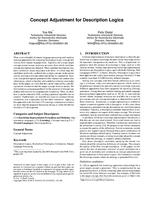Concept Adjustment for Description Logics
From International Center for Computational Logic
Concept Adjustment for Description Logics
Yue MaYue Ma, Felix DistelFelix Distel
Yue Ma, Felix Distel
Concept Adjustment for Description Logics
In Mathieu d'Aquin and Andrew Gordon, eds., Proceedings of the 7th International Conference on Knowledge Capture, 2013. ACM
Concept Adjustment for Description Logics
In Mathieu d'Aquin and Andrew Gordon, eds., Proceedings of the 7th International Conference on Knowledge Capture, 2013. ACM
- KurzfassungAbstract
There exist a handful of natural language processing and machine learning approaches for extracting Description Logic concept definitions from natural language texts. Typically, for a single target concept several textual sentences are used, from which candidate concept descriptions are obtained. These candidate descriptions may have confidence values associated with them. In a final step, the candidates need to be combined into a single concept, in the easiest case by selecting a relevant subset and taking its conjunction. However, concept descriptions generated in this manner can contain false information, which is harmful when added to a formal knowledge base. In this paper, we claim that this can be improved by considering formal constraints that the target concept needs to satisfy. We first formalize a reasoning problem for the selection of relevant candidates and examine its computational complexity. Then, we show how it can be reduced to SAT, yielding a practical algorithm for its solution. Furthermore, we describe two ways to construct formal constraints, one is automatic and the other interactive. Applying this approach to the SNOMED CT ontology construction scenario, we show that the proposed framework brings a visible benefit for SNOMED CT development. - Forschungsgruppe:Research Group: AutomatentheorieAutomata Theory
@inproceedings{ MaDi-KCap13,
author = {Yue {Ma} and Felix {Distel}},
booktitle = {Proceedings of the 7th International Conference on Knowledge Capture},
editor = {Mathieu {d'Aquin} and Andrew {Gordon}},
publisher = {ACM},
title = {Concept Adjustment for Description Logics},
year = {2013},
}
